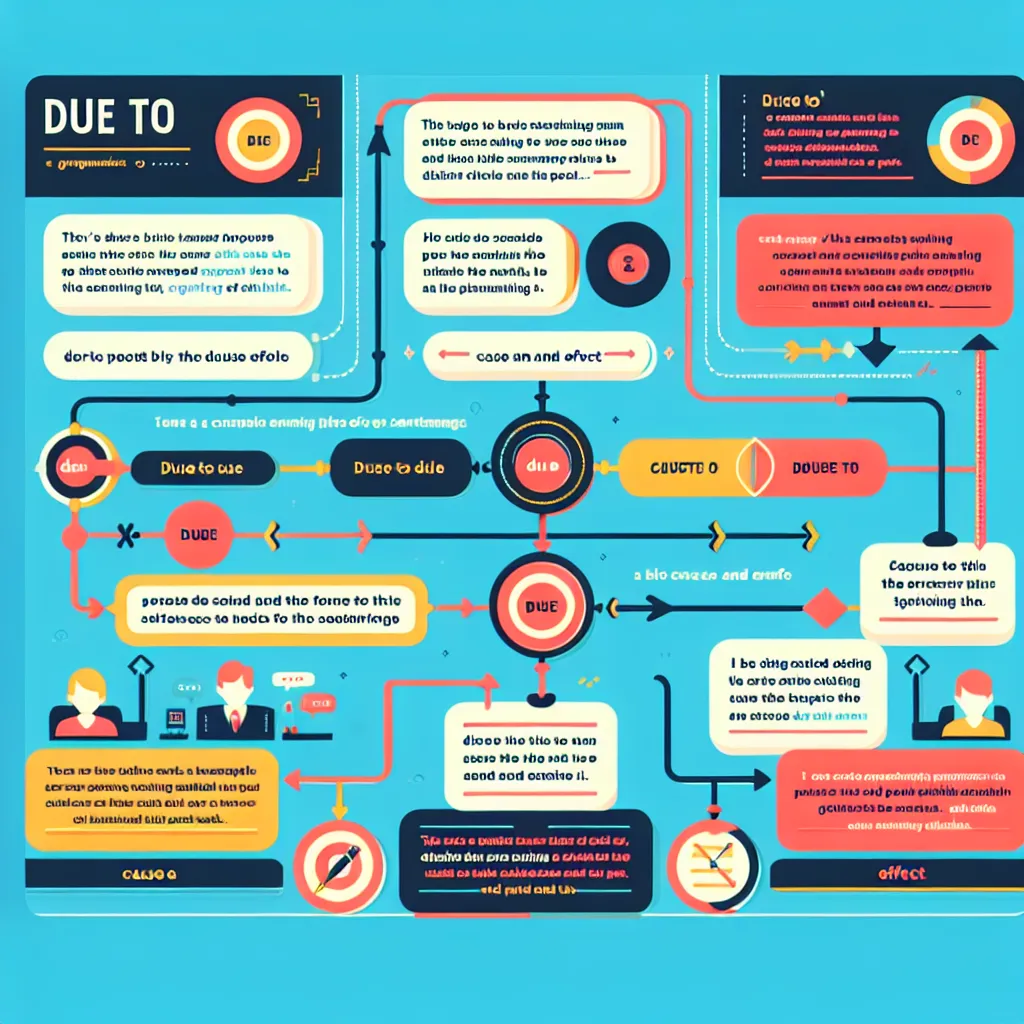“Due to” is a common phrase that often appears in IELTS exams, both in reading passages and as a useful expression for writing tasks. Understanding how to use this phrase correctly can significantly improve your language accuracy and help you achieve a higher band score. Let’s explore the proper usage of “due to” and how to incorporate it effectively in your IELTS responses.
Understanding the Meaning and Usage of “Due to”
“Due to” is used to introduce a reason or cause for something. It’s similar in meaning to “because of” or “as a result of.” In IELTS, you’ll often encounter this phrase in reading passages discussing causes and effects, or you may need to use it in your writing to explain reasons for various phenomena.
Here are some examples of how “due to” is used in sentences:
- The flight was delayed due to bad weather. (Here, “due to” introduces the reason for the delay)
- Many species are becoming extinct due to climate change. (This sentence uses “due to” to explain the cause of extinction)
- The company’s profits increased due to a new marketing strategy. (In this case, “due to” introduces the reason for the profit increase)

Grammar Rules and Structure: How to Use “Due to” Correctly
Understanding the correct grammatical usage of “due to” is crucial for IELTS success. Here’s the basic structure:
[Subject] + [Verb] + [due to] + [Noun/Noun Phrase]
It’s important to note that “due to” should be followed by a noun or a noun phrase, not a clause. Let’s break down this structure with some IELTS-style examples:
- The decline in biodiversity is due to habitat destruction. (Subject: decline, Verb: is, Noun Phrase: habitat destruction)
- Urban air pollution has increased due to industrial emissions. (Subject: pollution, Verb: has increased, Noun Phrase: industrial emissions)
- Many students fail to complete their studies due to financial difficulties. (Subject: students, Verb: fail, Noun Phrase: financial difficulties)
Common Mistakes to Avoid
When using “due to” in your IELTS writing or speaking, be careful to avoid these common errors:
-
Using “due to” at the beginning of a sentence without a subject and verb:
- Incorrect: Due to the rain, the match was cancelled.
- Correct: The match was cancelled due to the rain.
-
Following “due to” with a verb:
- Incorrect: The project failed due to not having enough funds.
- Correct: The project failed due to a lack of funds.
-
Confusing “due to” with “because of”:
- While these phrases are similar in meaning, “due to” is traditionally used as an adjective phrase, while “because of” is used as an adverb phrase.
- Example: The cancellation was due to bad weather. (correct)
- Example: The event was cancelled because of bad weather. (also correct)
Applying “Due to” in IELTS Writing Tasks
In IELTS Writing Task 1 and Task 2, using “due to” can help you explain causes and effects more clearly. Here are some examples of how to incorporate this phrase into your essays:
Task 1 (Academic) – Graph Description
“The graph shows that CO2 emissions increased sharply between 1990 and 2000, due to rapid industrialization in developing countries.”
Task 2 – Essay Writing
“Many argue that the rise in obesity rates is due to the prevalence of fast food and sedentary lifestyles. While these factors certainly contribute, I believe the issue is more complex and is also due to changes in work patterns and decreased emphasis on physical education in schools.”
Enhancing Your IELTS Score with “Due to”
To achieve a higher band score in IELTS, it’s not just about using “due to” correctly, but also about using it effectively and in conjunction with other complex structures. Here are some tips:
-
Vary your language: While “due to” is useful, also use synonymous phrases like “as a result of,” “owing to,” or “attributed to” to demonstrate a wide vocabulary range.
-
Use in complex sentences: Combine “due to” with other clauses for more sophisticated structures:
- “While the initial decline in sales was due to market saturation, the subsequent recovery can be attributed to innovative product design.”
-
Incorporate into different sentence types: Use “due to” in various sentence structures to showcase your grammatical range:
- Conditional: “If the project fails due to lack of funding, we will need to reassess our financial strategies.”
- Passive: “The delay was caused due to unforeseen technical issues.”
-
Use in conclusions: “Due to” can be effective in summarizing causes in conclusion paragraphs:
- “In conclusion, it is evident that the housing crisis is primarily due to a combination of population growth, inadequate urban planning, and speculative investment.”
Common Errors and How to Avoid Them
To further improve your use of “due to” in IELTS, be aware of these additional mistakes:
-
Overuse: While “due to” is useful, overusing it can make your writing repetitive. Aim for a balance with other causal phrases.
-
Misplacing “due to” in a sentence: Ensure “due to” is placed close to the noun it modifies to avoid ambiguity.
- Unclear: “The team lost the game due to poor strategy playing without their star player.”
- Clear: “The team lost the game due to poor strategy and the absence of their star player.”
-
Using “due to” with vague or general nouns: Be specific to make your writing more impactful.
- Vague: “The project failed due to problems.”
- Specific: “The project failed due to budgetary constraints and missed deadlines.”
Conclusion
Mastering the use of “due to” can significantly enhance your performance in the IELTS exam. Remember to use it to introduce specific causes, follow it with a noun or noun phrase, and incorporate it into varied and complex sentence structures. Practice using “due to” in different contexts, and don’t forget to balance it with other causal expressions to demonstrate a rich vocabulary. With these tips and consistent practice, you’ll be well-equipped to use “due to” effectively in your IELTS writing and speaking tasks, potentially boosting your overall band score.